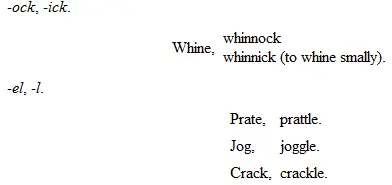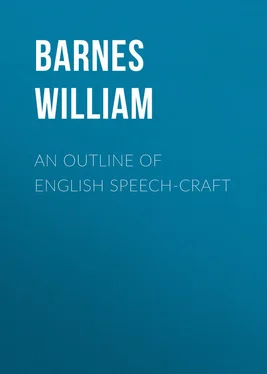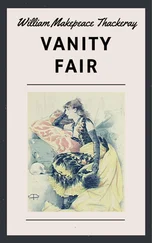William Barnes - An Outline of English Speech-craft
Здесь есть возможность читать онлайн «William Barnes - An Outline of English Speech-craft» — ознакомительный отрывок электронной книги совершенно бесплатно, а после прочтения отрывка купить полную версию. В некоторых случаях можно слушать аудио, скачать через торрент в формате fb2 и присутствует краткое содержание. Жанр: foreign_antique, foreign_prose, на английском языке. Описание произведения, (предисловие) а так же отзывы посетителей доступны на портале библиотеки ЛибКат.
- Название:An Outline of English Speech-craft
- Автор:
- Жанр:
- Год:неизвестен
- ISBN:нет данных
- Рейтинг книги:3 / 5. Голосов: 1
-
Избранное:Добавить в избранное
- Отзывы:
-
Ваша оценка:
- 60
- 1
- 2
- 3
- 4
- 5
An Outline of English Speech-craft: краткое содержание, описание и аннотация
Предлагаем к чтению аннотацию, описание, краткое содержание или предисловие (зависит от того, что написал сам автор книги «An Outline of English Speech-craft»). Если вы не нашли необходимую информацию о книге — напишите в комментариях, мы постараемся отыскать её.
An Outline of English Speech-craft — читать онлайн ознакомительный отрывок
Ниже представлен текст книги, разбитый по страницам. Система сохранения места последней прочитанной страницы, позволяет с удобством читать онлайн бесплатно книгу «An Outline of English Speech-craft», без необходимости каждый раз заново искать на чём Вы остановились. Поставьте закладку, и сможете в любой момент перейти на страницу, на которой закончили чтение.
Интервал:
Закладка:
Things are marked as having much of something, as hilly , stony , watery ; or made of something, as golden , wooden , woollen ; or having some things, as two-legged , three-cornered , long-eared , or loved or hated ; of the same set or likeness of something, as lovely , quarrelsome , manly , childish ; wanting of something, as beardless , friendless .
Pitches of Suchness.
The Suchnesses of Things are of sundry pitches, which are marked by sundry shapes or endings or bye-words of the mark-words, as ‘My ash is tall , the elm is taller , and the Lombardy poplar is the tallest of the three trees’; or ‘Snow is whiter than chalk,’ or ‘Chalk is less white than snow,’ or ‘John is the tallest or least tall of the three brothers.’
These Pitch-marks offmark sundry things by their sundry suchnesses, as ‘The taller or less tall man of the two is my friend,’ or ‘The tallest man is less tall than the tree,’ or ‘The least tall man is taller than the girl.’
The three Pitches may be called the Common Pitch , the Higher Pitch , and the Highest Pitch .
The Welsh has a fourth Pitch-word, called the Even Pitch , as pell , far; pellach , farther; pellaf , farthest; pelled , as far (as something else).
Younger may mean younger reckoned from young, or younger reckoned from old ; as ‘Alfred at 80 is younger than Edward at 85.’ In this case we may well say less old .
Worse (wyrse) is shapen from wo , wa , we , a stub-root which means wrong , atwist , bad in any way, and is our woe .
The r in weor is most likely of a forstrengthening and not a comparative meaning — weor , wyr , very bad; weorer , wyrer , still more strongly bad. But, not to double the r , men might have put a strengthening s , and so had weors .
TIME-TAKING
You cannot behold a thing in your mind otherwise than in or under some doing or in some form of being.
Every case of being or doing is a taking of time, as ‘the lily is white,’ ‘the man strikes ,’ ‘the bird flies or was hit .’ For though the being white, or the striking or flying or hitting was only for the twinkling of an eye, it took time; for the eyelid takes time, however short it may be, to flit down and up over the eyeball. Thence the word commonly called the verb may be called the Time-taking word or Time-word , as it is called by the Germans Das Zeitwort ; or, as it is the main word of the thought and speech, it is the Thought-word or Speech-word ; or, as it is called in Latin and other tongues, the Word .
Welsh speech-lore has called the verb the soul 1 1 ‘Enaid yr ymadrod yw’r ferf.’
of the thought-wording.
Among the thousands of sundriness of time-taking there are some wide differences which should be borne in mind.
Unoutreaching or Intransitive.
Time-takings, which must or may end with the time-taking thing, as
To be. John cannot be another man.
To sleep ; to walk . John cannot sleep or walk another man.
Outreaching (Transitive).
Time-takings that may begin with the time-taking thing, and reach out to another, as
To strike ; to see . John may strike or see another man.
Time-giving.
If a man, A, takes time against another, B, as to see B, we should more truly say of B that he gives , not takes , the time which A takes.
The time-words for unoutreaching time-takings may be called Unoutreaching ; of the outreaching ones, Outreaching ; of the time-givings, Time-giving .
In some cases there is between the time-taking thing and the time-giving thing a middle one – the thing, tool, or matter with which the time is taken, as ‘John hit William with a stone’ or ‘a cane.’ But then, again, this wording is shortened by the putting of the name of the mid-thing as a time-word, as ‘John stoned or caned William.’ And this brings in a call for the marking of two sundry kinds of time-words – the strong or moulded, and weak or unmoulded time-words.
A time-word, when it tells a taking of time by one thing against another, is in the outreaching (active) voice – ‘John strikes the iron.’ When it tells of the giving of time, it is in the time-giving (passive) voice . When it tells of an unoutreaching time-taking it is in the middle voice .
For the causing of another thing to take time some tongues have set shapes of the time-word, as, in Hindustani, durna , to run; durāna , to make another run.
We have hardly any of such words, though such are —
Lie, lay.
Sit, set.
Rise, raise.
Time-takings for becoming or making another thing become otherwise are marked by the ending -en on the mark-word, as
To blacken.
To whiten.
Misdoing by the fore-eking mis- : —
Mistake.
Misread.
Longer-lasting time-takings marked by the ending -er , as

Short or small time-takings by endings such as

A time-taking, taken as a deed or being without any time-taking thing, is taken as a thing , and its name is a Thing-name , as to write .
As in Greek the Infinitive mood, tò gráphein , the ‘to write’; and in Italian, il scrivere , the ‘to write’ (the deed of writing or a writing), so the Infinitive mood-shape of the Saxon time-word was taken as a thing-name after the preposition to , to or for, as to huntianne (to or for the deed to hunt or hunting), as ‘Why does Alfred keep those dogs?’ ‘To huntianne.’
Thence we have our wording —
‘Any chairs to mend ?’ (any chairs to or for the deed mending),
‘A house to let ,’
‘Letters to write ,’
‘A tale to tell ,’
which is all good English.
It is an evil to our speech that the thing-shape now ending in -ing should be mistaken for the mark-word ending in -ing .
Unhappily two sundry endings of the old English have worn into one shape. They were -ung or -ing and -end .
Singung is the deed of singing, a thing. Singend is a mark-word, as in the wording ‘I have a singing bird.’
Sailing and hunting , in the foregiven thought-wordings, are thing-names, and not mark-words. Sailing is segling , as ‘ne mid seglinge ne mid rownesse’ (neither with sailing nor rowing). – Bede 5, 1.
‘ Wunigende ofer hyne’ ( woning [mark-word] over him). – Matt iii. 16.
Читать дальшеИнтервал:
Закладка:
Похожие книги на «An Outline of English Speech-craft»
Представляем Вашему вниманию похожие книги на «An Outline of English Speech-craft» списком для выбора. Мы отобрали схожую по названию и смыслу литературу в надежде предоставить читателям больше вариантов отыскать новые, интересные, ещё непрочитанные произведения.
Обсуждение, отзывы о книге «An Outline of English Speech-craft» и просто собственные мнения читателей. Оставьте ваши комментарии, напишите, что Вы думаете о произведении, его смысле или главных героях. Укажите что конкретно понравилось, а что нет, и почему Вы так считаете.












